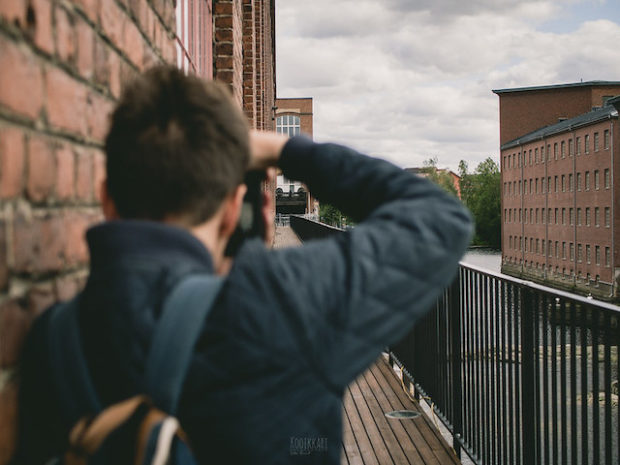You have no items in your cart. Want to get some nice things?
Go shopping
A New NIMBYism
Autumn has descended, and with it, a fresh wave of overenthusiastic university students upon the city of Oxford. They do not fill a vacuum, but readily occupy the place of the some 16,000 tourists, day-trippers and student “edu-tourists” who visit the city every day during the summer travel season. The passage of time has mercifully dulled my recollection of my own student years at Oxford University, but I still remember the unceremonious jostling and daily turf-battles that took place between tourists, townies and students in the beleaguered city centre. As a final-year student, I reluctantly gate-crashed many a pristine photo of the Christ Church, or “Harry Potter”, dining hall in my bid to reach the Examination Schools on time (although, as I was donning a curious combination of hijab and “subfusc” at the time, I hope the tourists didn’t feel too short-changed for their photographic efforts).
Oxford is just one of many destination cities that is beginning to suffer the effects of “overtourism” – a term that hit the headlines in 2017, and has only gained in traction since then. The term implies not only overcapacity in numbers, but also the unsustainability, even undesirability, of the associated tourist culture. Local inhabitants and environmental organisations have led the backlash against global tourism, particularly in European cities, from the banning of food trucks and selfie-sticks in Milan, to the recent announcement of a new tourist tax on day-trippers to Venice. Nevertheless, travellers remain unabated, continuing to make use of low-cost flights and cheap accommodation options in their quest to witness, photograph and publically demonstrate their presence across the globe. Many of us have, by all counts, brazenly severed ourselves into a dichotomy: both vigorous defenders of our private spaces, or “locals”, and bold venturers into unfamiliar places.
We might refer to this contradictory reality as the new NIMBYism: one that exemplifies the many double standards of the human condition. The backyards that we occupy, with their distinctiveness dulled to our senses, are now an endless source of fascination to others, and prime opportunities for Insta-“grammable” moments. En route to Venice in 2016, alongside the twenty-seven million other visitors who made the same trek that year, one guidebook that I read sagely cautioned its discerning readers to “walk in the opposite direction to the crowds” if they wanted to experience the richness of the city. This reassuring veneer of self-respectability shields us from being identified as part of the “crowd”, even when we patently are.
Oxford has long witnessed its fair share of “set-jetters” and visitors eager to absorb the city’s air of historic enlightenment, but a rise in tourism has left the city centre unnavigable in the summer months, except to those well-versed in the skill of crowd avoidance. As I transitioned from a student of the University to a resident of the city, my own NIMBYistic tendencies have been unleashed. I now watch in dismay as coaches carrying day-trippers block the cycle lines in Oxford’s cramped quarters, and the tourists shuttled therein tend to leave after only a few hours – increasing the flow of traffic without making any contribution to the city’s independent stores. I bristle as I walk past the £440m Westgate shopping centre, which opened two years ago, and has generated ghost-town effects on other parts of the city, including the closure of my favourite coffee shop haunt, Combibo’s. The owners of this shop made no effort to conceal their chagrin at the establishment of the Westgate centre, affixing a statement to the shop door in which they proclaimed that “Oxford is a shadow of the place we all fell in love with” (even I haven’t quite reached that state of disillusionment). Cornmarket Street, a major pedestrian precinct in the city, is increasingly inhabited by souvenir shops that sell marginal stylistic variations on Oxford-emblazoned hoodies and mugs.
To residents and visitors alike, there are bleakly comic undertones to the growth of tourism in Oxford. University students commend the most creatively fictitious tour guide anecdotes (one favourite being the “Bridge of Sighs” as named after the disheartened students who shuffled underneath it in a spirit of post-exam malaise). One elderly friend, struggling to navigate the crowded city centre using her walking aid, has confessed to simply using it to mow down large groups of stationary language tourists. There is even something wryly amusing by the recent opening of “Britain Heritage” [sic], a souvenir shop that has confidently taken its place next to Boswells department store, which has been trading modestly for its part since 1738. In the meantime, retail bulletins and city councillors alike commend the rise in “footfall” in the city: an indication of the need to scrutinise the statistics peddled out in support of the travel industry, as well as the desirability of “footfall” as an end in itself.
In the past, it has been customary to praise or condemn travel chiefly for its effects on the mind. For Mark Twain, it is “fatal to prejudice, bigotry and narrow-mindedness”; for D.H. Lawrence, it is “an exercise in disillusionment”. In contrast, the bullish character Mr Thwaites, in Patrick Hamilton’s The Slaves of Solitude, had “further narrowed his mind by a considerable amount of travel abroad”. And yet, the unregulated growth of the travel industry over the preceding decades no longer permits us the luxury of viewing tourism solely through the lens of discovery and self-fulfilment. We now need to find a more sustainable way of seeing the world – one that channels both the accountability of the travel industry and the conscientiousness of individuals.
The conversation has yet to shift significantly in these shores. This past summer, the UK government cheerily announced the creation of five new “tourism zones”. Oxford, of course, was granted the privilege of being one of them. With a prickling of my conscience, I bemoaned this news while descending upon the city of Bath, seeking welcome respite in its familiar unfamiliarity. In my defence, I departed the city rejuvenated by its mineral springs, but mug-less and hoodie-less. This I consider to be no small victory.

About Kawther Alfasi
Kawther Alfasi is a freelance writer based in Oxford. She holds a PhD in Political Science from the University of Warwick, and has previously worked in academic publishing.




